Contributing Writer
Kicking the Tires Becoming Obsolete as Truck Auctions Shift to Online Sales
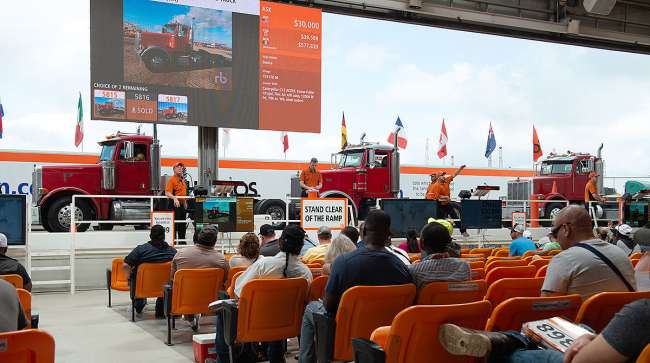
[Stay on top of transportation news: Get TTNews in your inbox.]
The big auction houses increasingly are turning to digital sales to move used heavy-duty trucks.
Remote online buyers made up more than three-quarters of the bidders at a Manheim truck auction in Indianapolis in January. And even buyers who traveled to the auction in person had to submit bids online.
At Ritchie Bros.’ February auction in Orlando, Fla., the company recorded $237 million in sales of trucks and heavy equipment items, with 53% going to online buyers. Purchases through the company’s mobile application doubled compared with the same auction a year earlier. The auction drew more than 14,000 online bidders, who made up almost 80% of all registered buyers.
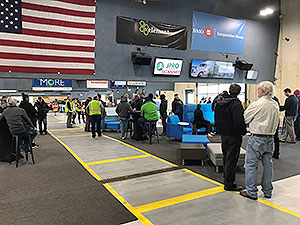
Digital bidders at a Manheim truck auction earlier this year. (Manheim)
“It is all digital now. It is what is happening everywhere,” said Bob Chinn, used truck sales manager at Uhl Truck Sales in Louisville, Ky.
Motor carriers also are seeing the transformation of equipment auctions.
“Anything data and digital is changing the sector,” said John Wilbur, CEO of Phoenix-based Roadmaster Group.
Digital bidding wasn’t common five years ago but is now a major component of truck auctions, Wilbur said.
“It saves you a flight or travel to the auction. But you need to be able to rely on the representations of the vehicle condition,” he said.
Indeed, the auction companies are providing detailed information about the trucks for sale. And they have to be accurate or else they lose credibility, Chinn said.
Reports generated by diagnostic tools such as Noregon’s JPRO allow digital buyers to get a view of what’s going on within a vehicle’s powertrain, Chinn said. Combined with plentiful photos, buyers are gaining confidence in purchasing without physically checking the truck.
“It is critical that each dealer has all the information they need to make a decision on whether to purchase the truck. They must be able to get a good understanding of the condition of the vehicle,” said Jane Gitere, director of national accounts for Manheim Specialty Auctions.
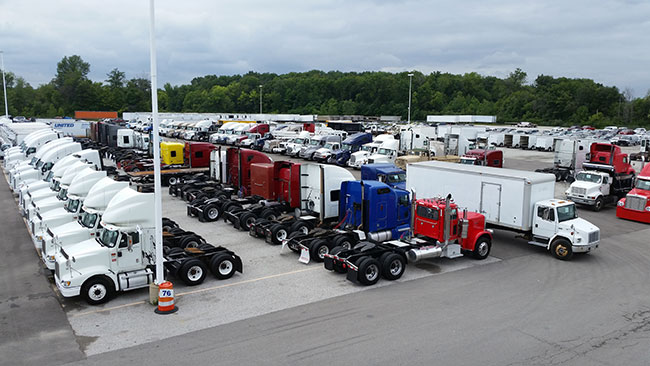
Manheim held its largest all-digital heavy truck auction in January at its Indianapolis location. (Manheim)
Manheim is using JPRO as a diagnostic tool on some trucks offered for sale online at its Indianapolis facility. The company is looking to expand the tool’s use to other sites as well.
Ritchie Bros. provides an oil sample analysis, videos of the engine running and hundreds of photos for the vehicles it auctions online.
“You are seeing what the auctioneer is seeing. If they have a good pre-auction description of the truck and you really know what you are buying, this is a good thing. You don’t have to go anywhere,” Chinn said.
He’s happy to avoid making winter trips and standing in the cold — even in a covered auction lane — to bid. When he’s physically at an auction, Chinn still places digital bids after looking at the trucks he is considering buying.
“You sit in the lounge, drink coffee and bid. There is no truck noise. You can think about what you are doing and you can even hear the auctioneer a lot better,” Chinn said.
Ritchie Bros. said 66% of the winning bids at its fourth-quarter auctions were placed online.
Although some of those bids came from shoppers at the auction site, Ritchie believes a high percentage of bids come remotely.
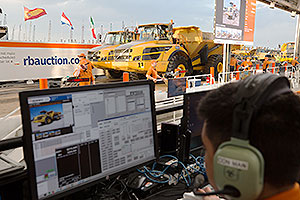
Modern equipment auctions take place on site and online simultaneously. (Ritchie Bros.)
“That’s probably the majority of the bidders in the transport sector where the assets are commoditized and the comfort level of buying online is high,” said Matt Ackley, the auction company’s chief marketing officer.
At a recent sale in Florida, 10 bidders from California competed to buy a 2006 Peterbilt 379 sleeper tractor.
“That’s about as far from Florida as you can get in the lower 48,” Ackley said.
Manheim jumped into digital auctions last year in Tucson, Ariz., converting the traditional vehicle auction lanes to what it calls digital blocks. In a traditional auction, vehicles are lined up for blocks at the large Manheim facilities, which feature drive-through lanes in a covered facility where bidders stand on the sidelines. An auctioneer sits in a raised booth and conducts the sale.
A digital block is an all-digital lane auction at a physical Manheim location using simulcast. The vehicle never physically moves; it’s only displayed on screen. They are offered for sale digitally by an auctioneer via oversized monitors featuring enhanced images, and VIN bar codes that buyers can scan to get pricing and other information. Vehicles are typically staged in designated spots at the facility and dealers can attend the sale in person or virtually.
The digital auction improves safety because bidders aren’t dashing out to look at the vehicles. The format also is more efficient and establishes consistency for Manheim’s truck buyers nationwide, the company said.
Manheim estimated that the switch to an all-digital format also saves 284 tons of carbon dioxide emissions annually, an amount equal to the annual electricity use of 45 homes.
Overall it has run heavy-duty truck auctions for several years at strategic locations. The Indianapolis facility does the biggest Class 8 business. Auction centers in Fort Worth, Texas; Fontana, Calif.; Orlando, Fla.; Morgantown, Pa.; and Grove City, Ohio, lean more to medium-duty box trucks.
“We auction trucks where there is a good market and where the locations have the space to park the trucks,” Gitere said.
While the auction industry is moving digital, the companies still see benefits from traditional auctions.
Used trucks are not commodities in that they are interchangeable one for one, said Steve Oliver, national director of sales for Taylor & Martin Inc.
“With the amount of technology in today’s trucks, and each unit being driven by a different driver, and maintained differently, the chance to see a truck lined up side by side with similar trucks at a live auction gives the buyer a good gauge of why a particular truck sells for a particular price,” Oliver said.
Live public absolute auctions are still the best method for sellers to turn an asset into cash and provide buyers to have a chance to inspect their potential purchases, he said.
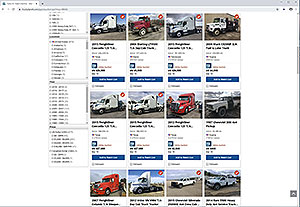
Auctioneers such as Ritchie Bros. are moving more trucking equipment through online channels. (Ritchie Bros.)
Yet the company is pushing into digital auctions. Taylor & Martin is working on multiple digital platforms to grow the digital portion of its business. It plans to launch new programs for both buyers and sellers by the end of this year.
“A good blend of people and technology is the answer,” he said.
It has to go digital if it wants to sell to customers such as Jason Hoffman, who owns two companies near Phoenix, Cactus Transport and Maverick Equipment. Hoffman purchases 50 to 100 trucks annually and 80% of those purchases are via online auctions, including 10 low-mileage day cabs recently acquired through a Ritchie Bros. auction in Texas.
“I am usually buying from fleets where I know they have maintained the trucks. I look for major players like the Halliburtons and the Schlumbergers,” Hoffman said.
Both are oilfield services companies based in Houston.
Hoffman said he’s careful not to buy single units previously owned by individuals, thinking that there is more risk.
But purchasing from fleets does yield an occasional dud.
“It’s a numbers game,” Hoffman said.
Even so, going the digital auction route is worth it because he can shop so many different regions.
“I used to fly to auctions but now I can sit in my office and bid it. Time is money. If I don’t get it, I just move on,” Hoffman said. “This really is the way of the future.”
Want more news? Listen to today's daily briefing:


